
A woman walking on the street can be picked up with no trouble at all. She can be raped, beaten and left in the cold to die a horrible death. The perpetrators, if unlucky, might be sentenced for a few years. That is if they’re caught. That is if the case is reported at all.
“There is a sense of impunity, a knowledge that more often than not they will get away with the crime,” says Kiran Manral, an activist working on child abuse and violence against women. “Also, the judicial process is long and time consuming, and very few victims even report the rape for fear of social stigma as well as the dread of dealing with the judicial process,” she adds.
According to reports, for every case that is brought to the police, fifty go unreported. That’s not all; the National Crime Records Bureau says the possibility of someone actually being convicted for rape has declined by one third in the past year.
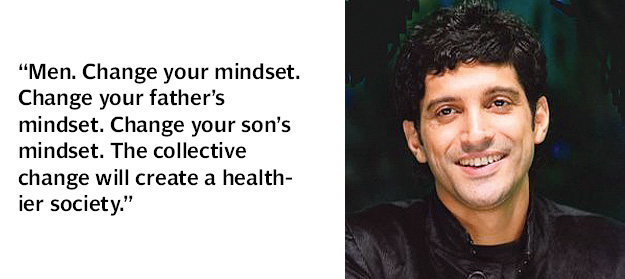
As I write this, a victim of rape is fighting for her life in a Delhi hospital. She was 23, a physiotherapist with her whole life ahead of her. Returning from watching Life Of Pi with a friend, she made the mistake of taking a private bus, not knowing the fate that awaited her. Now, even if she survives her horrific injuries, she will probably have to be fed intravenously for the rest of her life. This is because the men who raped her caused such damage that most of her intestines had to be removed by the doctors in order to save her life. While the sheer brutality of this case has sparked protests across India, she’s only the latest casualty of India’s rape epidemic.
About a fortnight ago, a 16-year-old girl died in the hospital after she set herself on fire after being raped by two men who had been stalking her. The rapists’ relatives watched on and did nothing to intervene. Traumatised, she poured kerosene on herself and set herself on fire.
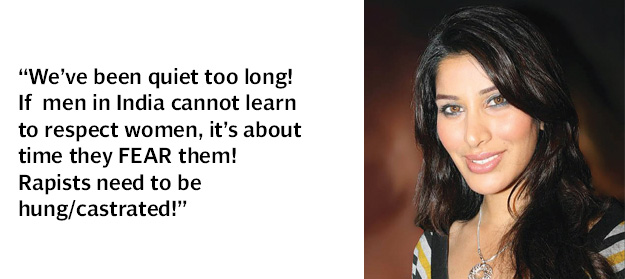
Many analysts have tried to fathom the reasons for the rising rate of sexual assault. Marnal says that the main reasons are, “change in social attitudes, urban isolation, declining gender ratio, easy access to pornography, distorted perceptions of relationships and the social taboo around sex.”
But if you ask Jitender Chhatar, a leader of a khap panchayat (local council) in the state of Haryana, it’s because of chow mein. “To my understanding, consumption of fast food contributes to such incidents. Chow mein leads to hormonal imbalance evoking an urge to indulge in such acts,” he said. Several khap panchayats tried their hands at giving a solution to the rape epidemic, including lowering the age of marriage for girls to 16, because they apparently think that married women don’t get raped. Also, they feel early marriages keep women’s sexual desires in check. How that would deter rapists, of course, is a question that remains unanswered, at least by the panchayats.
The problem doesn’t stop there. According to Haryana Congress president Phool Chand Mullana, the increase in rapes in the state is due to a “political conspiracy”. Not to be outdone, Dharamveer Goyal the Congress-I spokesman for the state went on to say that 90% of rapes were in fact consensual. Then there’s West Bengal chief minister Mamata Bannerjee who says that rapes happen because men and women interact more freely now than even before.
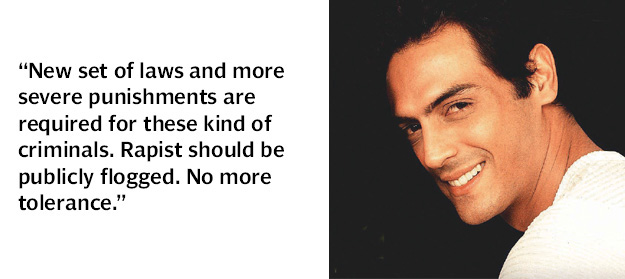
Changing these mindsets may not be possible, but attempts have been made to at least change legislation. Six months ago, the Union Cabinet introduced the Criminal Law (Amendment) Bill, 2012 in Parliament. According to this bill, “The punishment for sexual assault will be for a minimum of seven years which may extend to imprisonment for life.”
However, several activists say that draconian laws in fact create more problems than they solve. “The popular idea is that severe punishment deters crime, but the fact is that very severe punishments in fact deter conviction. The more severe the punishment, the higher the evidentiary standards and the harder it is to actually sentence someone,” says Dr Swarna Rajagopalan, Managing Trustee of The Prajnya Trust, an NGO working on issues related to peace, justice and security. “That means that more people get off scot-free, actually.”
However, other activists argue that legal procedures must keep pace with changing dynamics. Apart from increased punishments, several sociologists have been campaigning for fast track courts to deal with rape cases, a sensitised police force and in-camera hearings for many decades now.
But ultimately, it is change in the mindset of the people that is the need of the day. “This generation of parents has to push for a change in mindsets that needs to begin at home. We need to bring up our boys to become men who will respect women, and who know that a woman’s no means a no, and not a perhaps, a maybe, or a yes,” says Marnal.
The Delhi gangrape has certainly created a storm in the Indian parliament. For a change, the Lok Sabha and the Rajya Sabha saw members of all parties speaking with a single voice while they raised concerns over repeated incidents of rape in the national capital, the responsibility for the law and order of which lies directly with the Union Home Ministry.
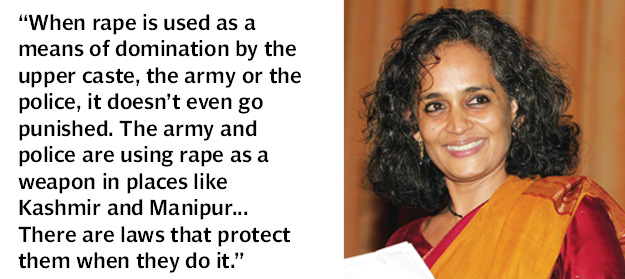
But this time, it seems the Indian people are not taking the politicians at their word. As this story goes into print, the Indian capital has seen massive protests that have caused nine metro stations closing down, resulting in complete chaos in the city. Violent clashes between protestors and the police have seen the use of water cannons, lathi-charges and tear gas. At least one person, a local journalist, has been shot dead by police. The protests have prompted a “deeply saddened” Prime Minister Dr Manmohan Singh to appeal for calm, but he has also come under criticism for appealing a week too late. Over a bloody weekend on the 22 and 23 December, more than a 100 people were injured, with India Gate looking like a battleground. But the question that remains to be answered is whether these protests will be able to galvanize a nation into making concerted efforts for a lasting change or not. Will India be, at the end of all this, a safer place for women? Everyone waits and watches for that answer.
If history is anything to go by, these voices will go mute in the course of time… until the next incident makes its way to the headlines. “We need to think about gender-based and sexual violence all the time and not just when something horrible happens,” says Dr Rajagopalan.
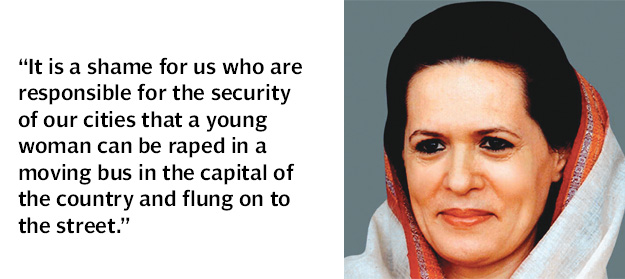
As I write this, another gang-rape in Delhi has made news on 21 December. A 40 year old woman was gang-raped by three men, not aboard public transport, but within the four walls of her home, after being forced to drink a spiked drink.
As I write this, I am aware that a woman is raped every 22 minutes in India. 24,206 rape cases were reported in 2012, showing a 10 per cent rise from 2010. Last year, every third victim was a child. More than 600 rape cases have been reported in New Delhi alone this year, according to government records, accounting for 30.3 per cent of total rape cases.
If these statistics do not shame the average Indian and the political leaders, then there is little hope for women in the world’s largest democracy.
Published in The Express Tribune, Sunday Magazine, December 30th, 2012.
Like Express Tribune Magazine on Facebook to stay informed and join the conversation.
COMMENTS (28)
Comments are moderated and generally will be posted if they are on-topic and not abusive.
For more information, please see our Comments FAQ

1731479848-0/Elon-Musk-and-Vivek-Ramaswamy-and-Donald-Trump-(1)1731479848-0-165x106.webp)







1730959638-0/trump-(19)1730959638-0-270x192.webp)







@G. Din: More advantage than you Indians would get in spending all your day on a Pakistani news site trying to throw mud at us. Whereas we Pakistanis don't even bother visiting your sites and post comments. We just don't care, it's more a problem with you Indians. This incident has brought so much shame on you only because of your uncontrollable urge of throwing garbage at Pakistan and its issues not realizing that it doesn't make any difference to us. It just shows how much you're burning in your own fire. Had it not been because of this mentality of yours, i would like many others, have been sympathizing with Indians rather than writing what i wrote. You, and others like you, would do well to read a comment from your fellow Indian named 'John' above. May the rape victim's soul rest in peace and the perpetrators brought to justice for the sake of humanity.
Shame on us in pk and in india who is promoting bollywood culture in the society. what effect do you people think it have on the youth when they see naked women showing their bodies in bollywood movies. offcourse such incidents will happent. its the culture which is totally inhuman. and unfortunately they same culture have been and still beeing exported to pakistan. now you will argue that its not the culture but the devil inside these barbarian people. yeah right? dont look at the truth and stop this bollywood crap, but find any other lame excuse just so you still can see and enjoy the nakedness in these movies. by the way i also include the lollywood crap culture in my comments.
@naeem hussain: ???? are you alrite? Political advantage on International arena on a rape case which happen in India? I mean I understand that you dont like India/Indians but this comment absolutely dont make any sense what so ever.
@naeem hussain: "Pakistan is behaving in civilized manners and not trying to gain any political advantage by the virtue of this incident. " Go ahead! Don't hold back! Gain whatever political advantage you van due to this incident. We have never wanted, nor asked for favours to be done to us, least of all from world's outcastes. Our society is an open book. Let us see where you get off after you have reaped all the political (and whatever other) advantage!
@Indian jones:
Whoa! How do know? In your dream or something? :P By the way, we all protested for Malala. And admit it that Damini's case is far worse.
we never witnessed such peaceful demonstrations ( or any demonstration by public) in Pakistan when Mukhtaran Mai went through similar ordeal.
Dear Indian/pakistani brothers (I am one of those frustrated Indians),
Please stop comparing problems and posting anti-pakistan/anti-india comments (I was one of the anti-pakistan commentator but this will be my last comment in this website as i believe that time has come to introspect myself) trying to show our respective countries are better off. I strongly believe that this is one of the reason why our countries are exactly at the same situation where the British left us. Time has come to introspect ourselves instead of looking across the border. If we go at this rate, law and order (which is already dying in one way or the other in both the countries) will collapse.
To my fellow Indians,
Please try to channel your energy and ideas towards our own nation as pakistan has citizens to take care of itself. We are too occupied with pakistan and its problems that has made us blind to our own problems. The "gang rape" incident is one such example of the failure of our people to concentrate in our nation's problems and its citizens. We have got lots of works to do.
I request ET to publish this as this would be my last comment in this website.
Thanks
John
RIP. Just makes me sad to see helpless people die due to sheer force and brutality, be it shias in Quetta, innocent muslims in pakistani mosques, rape victims in Delhi and Srinagar
We need to educate our socities and bring moderation and equality.
ET.. Could you put that picture..
Somebody needs to tell Arundathi Roy that the rapists were all low caste slum dwellers regarding her comment that upper castes dominate society by rapes. Silly lady who lives in her own world and who promotes her own agenda even if it goes against reality.
Our head are hung in shame, anger. Can't say more than that.
@Amer: more incidents happening in pakistan. but you cannot admit it publicly and you can't do anything. that is why people like you are making such comments on whats happening in India and what is people are doing against it in healthy way, which pakistan can't dream such things in next 500 years. (my comment is not an excuse)
As I write this, a victim of rape is fighting for her life in a Delhi hospital. She was 23, a physiotherapist with her whole life ahead of her.
There are many inaccuracies and distortions in this article. In the first place, the poor victim already succumbed to her horrendous injuries three days ago in a Singapore hospital. So, it's rather perplexing for the author to say "As I write this, a victim of rape is fighting for her life in a Delhi hospital..." unless she is referring to another gangrape case victim which the reader is not aware of.
Also, it is inappropriate to show comments and pictures of people like Arundhati Roy, Sonia Gandhi and a Bollywood B-rated actor called Arjun Rampal, all of whom have done little or nothing for women's cause, except mouth arm-chair comments on the social evils that - admittedly - prevail in Indian society. These guys love to come out and make comments in order to remain in public consciousness whenever there is a high-pitched national issue that angers people. India does not need such opportunists, including Sonia Gandhi who has, in fact, introduced and nurtured a culture of corruption and very nearly destroyed law and order by tolerating viciously dangerous criminals in her party, including her own son-in-law who is charged with heavy profiteering through illegal means. Indians are frustrated and angry; they realize that change can only come from the bottom -- and not from the top -- because the breed of politicians are as bad or worse than those that rule Pakistan. We do hope that India's large educated middle class, which has kept a woefully low profile despite bearing the brunt of abuses, will come forth and offer good people to lead this country that is otherwise admired by many as much as it is the envy of many in the world.
@Furqan:
Perhaps, you could do the same in Pakistan by protesting against the massacres of innocents by the Taliban and other religious elements, as Indians are doing on the streets not just Delhi but nationwide. You could also call to bring to justice those who rape,maime and kill minority girls or even Muslim girls who want to attend school but are prevented by your mullahs and their thugs from doing so. India has huge problems and Indians donot blame outsiders for their malaise -- that's a subtle hint for you to understand! The current display of anger on the streets of Delhi and other cities is but a reflection of the deep-rooted and pent-up anger against our politicians whom most Indians do not trust for a variety of reasons. The average Indian is conscious of the fact that politicians will not fix the country's problems and that it is time for the public to tell them that their attitude towards the common man -- also popularly known as Aam Admi -- has to change. What you are witnessing today on the streets of Delhi is a vibrant and mature democracy at work.
The more you show flesh in Bollywood movies the more it will affect the society. Its time to India to look back and reflect. You have polluted your society with lust and greed. Songs like Kanta laga, Anarkali disco chali, what message you want to give to the youth? Shame on hypocrites attending the cremation from Bollywood! Stop spreading the cancer in South Asia, put a ban on Indian dramas and movies!
@SB few thousands protester in a nation of billion
Our "Malai Yousofzai" did not make it! Now, what say you, Taliban! You could not ace us even in bestiality! Our beasts have put you to shame, admit it! Oh, dear God, have mercy on us for we have defiled the most precious gift You gave us - Faces of Innocence, our children! After that, with what face can we ask for strength and fortitude to weather this torrent of grief upon us?
If such incident had happened in Pakistan India was going to make big deal out of it both domestically and internationally. Pakistan is behaving in civilized manners and not trying to gain any political advantage by the virtue of this incident. That is the difference between the two countries.
The banner in the photo actually says 'Hang the rapists' (Balaatkaariyo ko Faansi do) (4 words) and not 'Obama save our sister because our government is impotent'
... these are the Left-Behind and Forsaken, able tly poor 98% in India ... trying to ape the Mully-wood film Characters ...
... India has used Rape as a tool for State Terror in Kashmir ... instead of stemming such attitudes in this society ... such an Approach of Hatching and Nurturing a Cancer is now coming back to hurt ordinary, innocent Indian women ... I
As long as sexual assault is promoted in Bollywood movies and rapists are not stoned I don't see any change.
@Furqan, who is in denial mode brother? Watch it on TV and you will know the kind of vocal protest going on for the last 2-3 weeks on the streets of India. Who are they? They are the people of India. The Indian society has got huge problems and the solutions would come from within the same society. That's what going on now - a dynamic and vibrant society is trying to rectify itself and forcing the government to deliver justice.
We get hate filled comments from Indian trolls everyday on these pages. I just hope for the sake of their women, they reflect on their own society for a day.
That's alarming!!!!! its about time for Indian to get out of this "all is well" bubble and put their thoughts on fixing problem at their home, instead of becoming political geniuses and commenting on problems of others. The collective mindset of entire Indian/Pakistani society is same, the human/women right issues in India are same (if not worse). The sooner they get out of denial mode, the better for their society.
India need to accept this reality that the major source of their orientation is from the media and the major chunk in the media is Bollywood. They need to change their orientation through the media which is giving them nothing but vulgrity in the name of entrertainment. Can't they see that the pattern used by the rapit is similar to what we see in bollywood films when villains rape the girls and throw them out of the bus? The problem is that when Bollywood and other media were crossing the red lines they didn't speak out. They thought its a part of freedom of speech and entertainment until even vulgairty came in their tv lounges through the programs which they see with their family members. Is it not obvious that after looking at all these vulgar programs people just become sxually active? Those who have money will go out to release sxual frustration. What about the poors? How will they release their frustration? Yes they will release their frustration by continuously harrassing public on the street. It's a simple logic that among the root causes, Bollywood has a major role in bringing violent behaviour in the society. If you think I am wrong, whats your say on the google most searches from India? Bollywood is a cancer and is spreading in Pakistan as well and if not stopped now, it will grow bigger and bigger and in 10 years from now, we might be seeing something which we would not have even thought. Please save your children
Nice article! Indians need to change their mindset towards women! To all the Indian parents, don't tell your daughter what to wear. Tell your son not to rape.